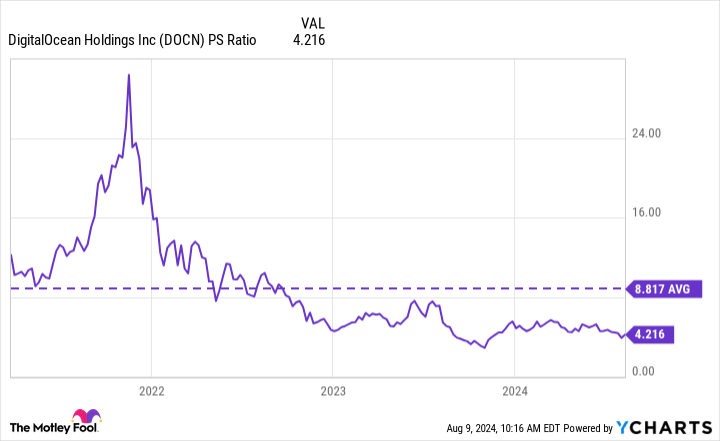Table of Contents
Microsoft, AmazonAnd Alphabet They are very different companies, but they are the top three players in the fast-growing cloud computing industry.
They offer hundreds of cloud services to businesses, from simple data storage to complex software development tools. More recently they have invested heavily in new data centers full of powerful graphics processors (GPUs) of, among other things Nvidiaand they lease the computing power to artificial intelligence (AI) developers. This could be one of the most valuable opportunities in the history of the cloud industry.
Microsoft, Amazon and Alphabet are locked in a fierce battle for AI market share. DigitalOcean (NYSE: DOCN)on the other hand, has carved out a lucrative niche by serving only small and medium-sized businesses (SMBs), which are often overlooked by its multibillion-dollar competitors. DigitalOcean stock seems to have great value, and here’s why investors might want to buy it now.


Democratizing access to AI infrastructure
Cloud leaders typically focus on serving large organizations because they have the highest budgets, while SMBs receive less attention. DigitalOcean focuses exclusively on those customers, whether they are in the start-up phase or have up to 500 employees.
DigitalOcean offers them highly personalized service, clear and transparent pricing, and cloud tools that are easy to implement, because the company knows that most of its customers cannot afford in-house engineering teams.
DigitalOcean is now using that blueprint to deliver affordable AI solutions to customers. Right now, cloud leaders are giving their largest customers access to tens of thousands of GPUs of computing power, meaning developers with significant financial resources are building the most advanced AI models. Smaller companies simply cannot compete.
DigitalOcean recently announced that it will give its customers access to small numbers of AI GPUs (typically between one and eight), including Nvidia’s flagship H100to integrate AI into their workflows at a scale that suits them. CEO Paddy Srinivasan says this fractional on-demand access to GPUs is the first of its kind for the industry, and will help democratize access to AI.
The company will also open a new, state-of-the-art data center in Atlanta in early 2025, which will expand its AI computing capacity. It adds to the capacity that DigitalOcean acquired when it bought Paperspace last year, a specialist in providing AI data center infrastructure at affordable rates.
In fact, Paperspace is up to 70% cheaper than cloud leaders like Microsoft Azure when it comes to AI compute capacity, because it offers per-second billing to reduce waste and doesn’t lock customers into contracts. Additionally, it has a leaner cost structure because it offers a limited number of services and passes these savings on to the customer.
DigitalOcean’s revenue growth is accelerating again
DigitalOcean generated record revenue of $192.5 million in the second quarter of 2024 (ended June 30), which was an increase of 13% from the same period a year ago. It was the second consecutive quarterly growth acceleration.
The company’s revenue was regularly growing at over 30% per quarter just two years ago, so overall revenue has slowed significantly. One reason is that DigitalOcean is currently cutting costs to increase profitability. During the second quarter, the company had total operating expenses of $95 million, which was down 8.5% from the same period last year.
That resulted in net income of $19.1 million, an increase of a whopping 2,777%.
The fact that DigitalOcean has managed to accelerate its revenue growth while reducing costs and generating healthy profits really speaks to the organic demand for its cloud services.
Moreover, this is something that investors should pay attention to in the coming quarters. DigitalOcean said revenues attributable primarily to AI increased by as much as 200% year-over-year in the second quarter. The company didn’t disclose how much revenue it actually generated from its AI services (including Paperspace), so we can assume the growth occurred from a very low base figure, but it still signals rising demand.
Why DigitalOcean stock is a buy now
According to an estimate from Grand View Research, the cloud industry will be worth a total of about $730 billion this year. The SMB segment alone could be worth $114 billion, according to DigitalOcean, but the company expects it to grow 23% annually going forward, compared to just 21.2% for the cloud industry as a whole.
DigitalOcean’s strategy to deliver affordable AI infrastructure and services could add a new dimension to that opportunity, as it enters an entirely new market that is underserved by other providers. Global consultancy PwC believes AI will add $15.7 trillion to the global economy by 2030, making it by far the biggest financial opportunity DigitalOcean has seen to date.
Shares of DigitalOcean are currently trading 75% below their all-time highs during the tech frenzy of 2021. It was overvalued at the time with a price-to-sales ratio (P/S) of around 30, but the company has grown since then, with sales flat remained, and the price/earnings ratio is now only 4.1.
That’s more than a 50% discount from the average P/S ratio of 8.8, which dates back to when the company went public in 2021:
Simply put, DigitalOcean stock appears to be a good value right now. Combine that with the company’s accelerating revenue growth, rising profitability, and huge opportunities in the cloud and AI industries, and investors might do well to start buying.
Should You Invest $1,000 in DigitalOcean Now?
Before you buy shares in DigitalOcean, consider the following:
The Motley Fool stock advisor The analyst team has just identified what they think is the 10 best stocks for investors to buy now… and DigitalOcean wasn’t one of them. The ten stocks that survived the cut could deliver monster returns in the coming years.
Think about when Nvidia made this list on April 15, 2005… if you had $1,000 invested at the time of our recommendation, you would have $641,864!*
Stock Advisor provides investors with an easy-to-follow blueprint for success, including portfolio building guidance, regular analyst updates, and two new stock picks per month. The Stock Advisor is on duty more than quadrupled the return of the S&P 500 since 2002*.
*Stock Advisor returns August 12, 2024
John Mackey, former CEO of Whole Foods Market, an Amazon subsidiary, is a member of The Motley Fool’s board of directors. Suzanne Frey, a director at Alphabet, is a member of The Motley Fool’s board of directors. Anthony Di Pizio has no position in any of the stocks mentioned. The Motley Fool holds positions in and recommends Alphabet, Amazon, DigitalOcean, Microsoft, and Nvidia. The Motley Fool recommends the following options: long January 2026 $395 calls to Microsoft and short January 2026 $405 calls to Microsoft. The Motley Fool has one disclosure policy.
If you like Microsoft, Amazon, and Alphabet, you might love these growth stocks was originally published by The Motley Fool


